Can there be an allergy due to nerves? As a rule, the cause of a non-standard reaction of the body is some kind of allergen: cat hair, pollen, dust, food or medicine. In some cases, a stressful state can also act as an irritant.
Nervous allergies develop against a background of constant stress, excessive emotionality, and prolonged overexertion. True, in scientific circles in this case they often talk about pseudo-allergy, i.e. a pathological condition in which a set of symptoms characteristic of a “normal” disease is observed, but the allergen is absent.
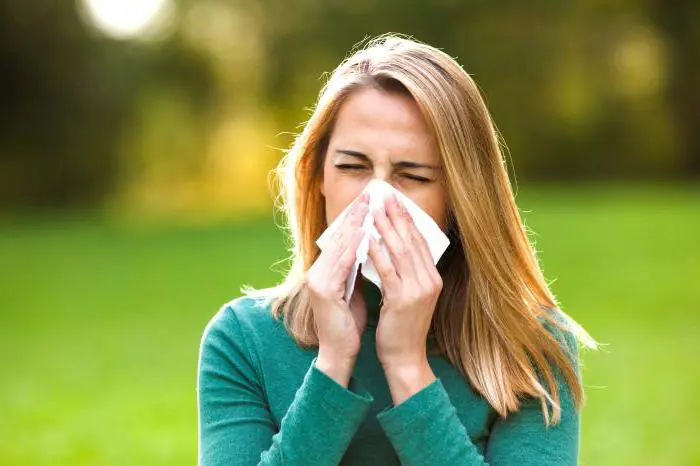
Other common causes of nerve-related pseudoallergy include the following:
- Malfunctions in the functioning of the body's immune system. Weak immune defense predetermines greater susceptibility to allergic reactions in principle.
- Stress, which may be accompanied by eating or appetite disorders, insomnia, increased fatigue and irritability.
- Depression that persists for a long time reduces immunity and worsens physical and psycho-emotional state. As a result, inflammatory processes develop and the risk of allergic reactions increases.
The difference between a nervous allergy and a true one
The true form of the disease is characterized by the presence of a reaction only upon direct contact with the irritant. Nervous allergies (symptoms, the treatment of which are described below in the relevant sections) are pseudo-allergies, that is, they arise solely as a result of emotional shocks.

This disease affects anxious, overly sensitive and unbalanced people. For some patients, for example, it is enough to look in the direction of flowering plants and they will feel the entire list of symptoms that characterize a disease such as a nervous allergy (treatment, by the way, also involves normalizing the psychological state). Other people experience anxiety symptoms after a stressful situation, when alone, or when scared.
Physical manifestations of allergies
Nervous allergies manifest themselves with the same general symptoms as any other type of individual reaction to foods or other irritants. Thus, patients primarily complain about dermatological manifestations, which include:
- rashes that are accompanied by itching (the symptom most often appears on the face, hands and scalp);
- a rash that may appear in the mouth; this condition is often confused with incipient stomatitis;
- urticaria - red blisters appear, slightly rising above the surface of the skin;
- runny nose, which appears even in warm weather and is characterized by mucous discharge, lacrimation;
- dry cough - a symptom that accompanies allergies and persists even after taking antitussive medications;
- a feeling of lack of air, in some cases posing a serious threat to life and health;
- excessive sweating, rapid heartbeat and shortness of breath even with minor physical activity;
- trembling in the body, chills or fever, nausea are signs of pseudo-allergy, which do not appear as often as other symptoms;
- paleness of the skin, especially on the limbs and face;
- unpleasant sensations, discomfort in the chest, solar plexus;
- Digestive problems - a symptom that occurs somewhat less frequently than typical skin manifestations of allergies.

The set of signs characterizing this type of reaction may vary depending on the individual characteristics and degree of sensitivity of the body. A particular danger arises when swelling of the respiratory organs develops, because in this case suffocation is possible. Sometimes a nervous allergy (the symptoms are more serious) is accompanied by fainting.
Nervous system symptoms
If the manifestations listed above can also occur with true allergies, then the nervous form of the disease is also characterized by exceptional symptoms. Nervous allergies are distinguished by certain mental manifestations, among which are:
- increased irritability;
- frequent mood changes;
- depression;
- confusion of thoughts;
- weakness, loss of strength, drowsiness;
- decreased performance and concentration;
- recurrent headaches;
- decreased visual acuity, “fogging,” although no physiological problems are diagnosed.
Allergic vegetative storm or panic attack
Nervous allergies (photos of physiological manifestations that may characterize the condition, below) do not make themselves felt all the time. That is why scientists introduced the concepts of “allergic vegetative storm” or “panic attack,” which better describes the patient’s condition. Such concepts mean an attack of anxiety, panic or excitement, which is accompanied by four or more physiological symptoms.
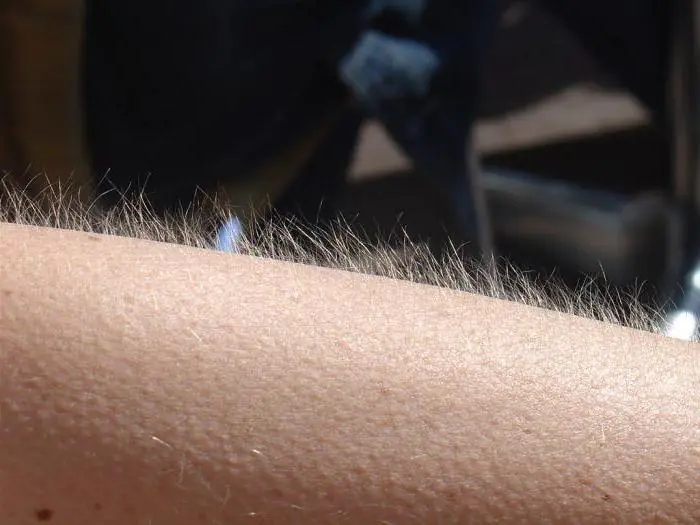
Diagnosis of allergies due to nerves
When diagnosing a nervous allergy, the doctor must pay special attention to the emotional state of the patient. As a rule, people suffering from this form of allergic reaction are characterized by increased excitability, anxiety, and an unstable psycho-emotional state.
Tests for suspected nerve allergies
In addition, the following studies allow us to diagnose the body’s non-standard reaction to stress at the physiological level:
- Skin tests. In the nervous form of the disease, tests carried out in a calm state show negative results, except during the period of the vegetative storm itself.
- Assessment of the level of immunoglobulin E. Nervous allergies are not accompanied by an increase in the level of immunoglobulin E, as is the case with the true form of the disease.
Drug treatment of nerve-related allergies
To effectively treat nerve allergies, you should definitely visit an allergist. The doctor will conduct the necessary studies and tests, and make a qualified conclusion on how the patient can get rid of such a disease as an allergy due to nerves (photo).
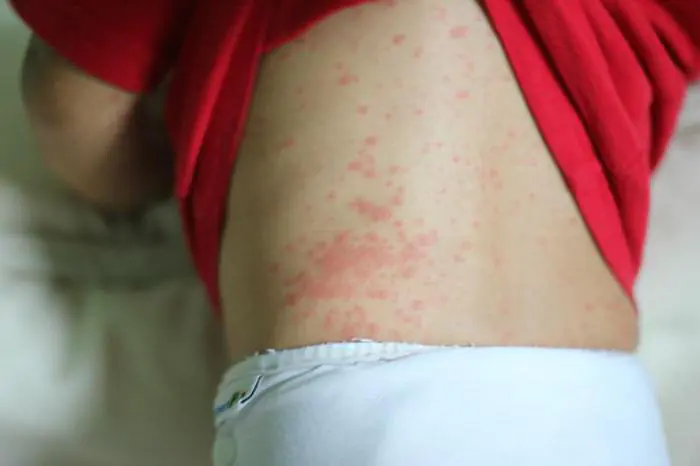
Treatment must be comprehensive. As a rule, medications help fight the manifestations of an allergic vegetative storm, but only normalization of the nervous system will allow you to forget about attacks forever. In some cases, however, it is enough to eliminate the stress factor: for example, change jobs or stop communicating with “difficult” relatives.
Drug therapy includes taking special antihistamines, as well as sedatives and, possibly, hormonal drugs and herbal preparations. Antihistamines help alleviate the patient’s condition during attacks, while other medications affect the causes of the development of pathology.
Normalization of the nervous system
Nervous allergies cannot be eliminated by medications alone. Symptoms (photos of physiological manifestations, of course, do not reflect the depressed psycho-emotional state of the patient), manifested by the nervous system, require relief by other methods.

So, a person suffering from a nervous form of allergy first of all needs to establish a positive emotional background. A visit to a psychologist, neurologist or psychiatrist, art therapy and other activities that have a calming effect will help with this. Some patients stop feeling the manifestations of allergies due to nerves after a course of massage of certain points, acupuncture, hypnosis or neurolinguistic programming, reflexive-manual therapy.
In addition, you should, if possible, avoid stress, excessive stress (both emotional and physical), not worry about trifles, and change your perspective on problems. It is important to try to identify the main source of stress and eliminate it. For example, changing jobs, reconsidering life values, positive communication with loved ones, and minimizing stress will help.
Prevention of allergies due to nerves
The nervous form of allergies is a common problem today. This is due to the fast pace of life, constant stress, lack of physical activity, poor nutrition, bad habits and social problems. To prevent the development of a non-standard reaction of the body to stress, you need to try to avoid overexertion, learn to relax and create a positive atmosphere around yourself.

Taking soothing mixtures of medicinal herbs also helps. Such teas are sold in any pharmacy. Teas with thyme, mint, and lemon balm are suitable for occasional use. In addition, it is important to adhere to an optimal work and rest schedule, allocate sufficient time for sleep, eat right, take vitamins if necessary, and engage in feasible sports or exercise at least some physical activity.
You can improve your condition after a hard day at work, for example, through meditation, yoga or massage sessions. It is important to avoid constant physical fatigue. Swimming and dolphin therapy help develop the physical body and at the same time improve the psychological state. Communication with animals is also useful.
When studying a photo of a rash on the body of an adult due to nervousness, it is clear that it is practically no different from the one that appeared for other reasons. Therefore, if you detect unpleasant formations on the skin, you should consult a doctor. Only a specialist will be able to determine the exact cause of the problem and prescribe effective treatment.
Causes
Nervous rash is common. Against the background of stress, many hidden diseases appear and the functioning of the entire body worsens. This happens for the following reasons:
- stress leads to a weakening of the immune system, which cannot effectively resist the negative effects of irritating external factors;
- in women, a rash on the body due to worries appears more often, since they are more emotional and sensitive;
- an unstable emotional state negatively affects all organs, which leads to numerous disruptions in their functioning.
Despite the fact that skin rashes appear after stress, the hereditary factor plays a major role in the development of this process.
Rash in the form of urticaria
The disease is characterized by the appearance on the surface of the skin of raised blisters of different sizes, colored reddish.. In appearance, they resemble spots that are found after a nettle burn or after an insect bite. Urticaria rashes can appear on any part of the body. Over time, they disappear and form elsewhere.
When studying a photo of a rash from nerves with urticaria, it is clear that the lesion is not accompanied by the release of pus or fluid. With the development of this pathology, the patient exhibits many other unpleasant symptoms:
- feeling of anxiety;
- labored breathing;
- tightness in the heart area;
- severe itching, which provokes irritability and nervousness;
- trembling in the limbs;
- swelling of the affected areas of the skin;
- loss of appetite.
The reasons for the development of hives may be malfunctions of the digestive, immune system, heart problems or mental disorders.
Nervous scabies
The appearance of rashes on the hands or other parts of the body is not always associated with stress or psychological problems. But this reason for the development of the disease is very common.
The following signs indicate nervous scabies:
- A red rash is found on the skin. It is localized on different parts of the body.
- The surface of the epidermis becomes swollen and itchy, which causes the patient a lot of suffering.
- A person feels tired, lack of strength, and anxious.
- Body temperature rises slightly.
If such symptoms appear, you should consult a doctor who will prescribe the necessary tests and appropriate treatment. Without proper treatment, scabies can become chronic.
Allergy
Most often it appears due to exposure to various external factors on the body - after eating certain foods, upon contact with household chemicals, extremely low or high temperatures. Very often, redness and irritation of the skin can occur due to severe stress.. It is he who triggers autoimmune processes that are dangerous to humans, as a result of which the immune system attacks its own cells.
The causes of nervous allergies are:
- low emotional stability;
- tendency to depression;
- hereditary predisposition to allergies;
- decreased protective functions of the body.
Symptoms of allergies that appear on nerves:
- rashes are localized on different parts of the body;
- skin itches;
- the patient may complain of a runny nose, cough in the absence of other cold symptoms;
- breathing becomes difficult;
- frequent sneezing, watery eyes;
- headache;
- significant deterioration in health;
- drowsiness;
- Tachycardia is alarming.
Psoriasis
This is a serious dermatological disease, the etiology of which is not fully known. The psychological factor plays a large role in its appearance. When describing this pathology, it should be noted that most patients experience the following alarming symptoms:
- reddened areas of the body are covered with scales - psoriatic plaques;
- severe itching;
- the skin is dry and flaky;
- When the psycho-emotional state is disturbed, the number of rashes increases.
The appearance of psoriasis is explained by severe negative experiences, which leads to disruption of the immune system and a failure of metabolic processes in the epidermis.
Eczema
Rashes on the arms, stomach, or other parts of the body may indicate the development of eczema. The following signs indicate this:
- The skin may turn red and spots characteristic of eczema may appear.
- The affected areas of the body peel, become inflamed, and become swollen.
- Small bubbles form on the epidermis, which burst over time.
- Due to developing symptoms, the patient's sleep is disturbed, he feels unwell and tired.
- The affected areas of the skin look like wounds, which are gradually covered with dry crusts.
Features of rashes in children
In a small child, urticaria most often appears due to nervousness. It is characterized by the formation of a small rash that can quickly develop and go away.
Common locations for blisters are the face and natural folds of the epidermis. If after the rash appears the child does not scratch it, there is a high probability that it will disappear on its own after some time.
Very rarely, children develop angioedema (a special form of allergic reaction) due to nervousness. But most often this happens in the presence of concomitant health problems.
Diagnostics
When a rash appears due to stress, a thorough examination of the condition of the sick person is necessary: both an adult and a child. It is very important to determine exactly what exactly was the impetus for the development of the disease. Therefore, diagnostics include the following:
- Allergy tests. The possible allergen that caused the skin rash is identified.
- Determination of the level of immunoglobulin E. Helps determine the presence or absence of an allergic reaction in the patient’s body.
- Consultation with a psychologist or psychotherapist to assess the psycho-emotional state.
The difficulty in diagnosing a rash due to stress is that by the time you visit a doctor, all unpleasant symptoms may disappear.
Therapy
Treatment of rashes caused by stress comes down to eliminating the irritating factors. First of all, it is necessary to normalize the psycho-emotional state of the patient, after which recovery quickly occurs.. To improve the patient’s well-being, symptomatic therapy is also prescribed.
Remedies for itching and rashes on the body
To relieve the patient from rashes and unbearable itching, which is present during the development of most dermatological diseases due to stress, the doctor prescribes the following medications:
- Soothing agents - menthol, salicylic acid, Diphenhydramine. Used as compresses. They are applied for 30 minutes, after which the itching disappears completely.
- Non-hormonal ointments. The most effective products from this group are called Fenistil, Nezulin, Skin-cap. They are applied to problem areas of the skin several times a day until complete recovery.
- Systemic antihistamines. If you suspect the development of an allergy, take Loratadine, Suprastin, Fexofenadine.
- Vitamin and mineral complexes to improve the functioning of the immune system.
- Corticosteroid hormones are prescribed in the most severe cases, when it is impossible to get rid of the disease using gentle means.
General recommendations
After the first alarming symptoms appear, you should consult a doctor. Only a specialist can accurately determine the causes of the disease and prescribe adequate treatment.
It is impossible to get rid of the problem if the psycho-emotional state is not normalized. To do this, you can consult with a psychologist, try to change the situation, and do not neglect communication with friends and family.
It is recommended to play sports or find other hobbies (embroidery, dancing, having a pet). This will help balance your mental state and relieve unnecessary worries.
To improve well-being, the patient should follow these recommendations:
- do not self-medicate, since it may not only not bring the desired result, but can also cause harm;
- stop eating foods that cause allergies;
- All alcohol and smoking are prohibited;
- Avoid exposing your body to extremely low or high temperatures.
Traditional methods
The following folk remedies will help get rid of rashes on the body caused by stress:
- Knotweed infusion. To prepare the medicine, 20 g of herb is poured into 245 ml of boiling water, kept under a closed lid for 2 hours, then filtered. To normalize the state of the nervous system, take one tablespoon of infusion three times a day.
- Infusion of wormwood. A teaspoon of plant material is poured into 510 ml of boiling water. After 2 hours, filter the infusion and take a tablespoon twice a day.
- Dill juice. Used to treat rashes to relieve itching, eliminate swelling and inflammation.
- Motherwort medicine. Pour 15 g of herb into 230 ml of boiling water and leave for 45 minutes. The resulting product is taken one tablespoon up to 5 times a day.
Prevention
You can prevent the appearance of rashes on the body only if you stabilize your emotional state. Stress and conflicts that can provoke a relapse of the disease should be avoided. This can be done if you learn to control your own emotions and not take everything too personally.
In critical situations, sedatives should be taken. You can periodically drink light teas with a sedative effect - from chamomile, mint, lemon balm. Tincture of valerian or motherwort has a pronounced calming effect.
If you learn to cope with stress, nervous rashes will never appear again. This should be especially taken care of by those people who are prone to developing various dermatological diseases - allergies, psoriasis, urticaria.
Nervous allergy is also called pseudoallergy - this is a condition characterized by the clinical manifestation of allergy, but there is no antigen-antibody reaction. 

Risk factors
Nervous allergies depend on several factors:
1. People who are unable to withstand stressful situations at work and at home are prone to allergies from nerves.
2. A disruption in the functioning of the immune system, which is responsible for the constancy of the internal environment and the ability to withstand the negative factors present in the life of every person.
3. Stress. The negative impact of emotional stress on the human body is expressed in insomnia, aggression towards others, insomnia, and apathy.
4 . Depression. As a result of long-term depressive conditions, a person’s general condition suffers, the immune response to infectious diseases decreases, and performance decreases. With prolonged depression, disturbances occur in all organs and systems of the body and a tendency to nervous allergies appears.
Prolonged nervous overstrain leads to disruption of internal biochemical reactions. Inflammatory mediators (histamines) begin to be released.
Allergy symptoms
Allergic syndrome manifests itself with various symptoms, from skin disorders to disruptions in the functioning of the cardiovascular and respiratory systems.
Usually, an allergy due to nervousness does not differ from the true one in its manifestation.
- Itching of the skin can occur against the background of rashes, urticaria, allergic eczema, or be the only symptom.
- The rash may take the form of large red spots or the appearance of a pinpoint rash (pictured). The most common location: face, chest, arms, scalp, but an allergic reaction cannot be ruled out on any area of the skin.
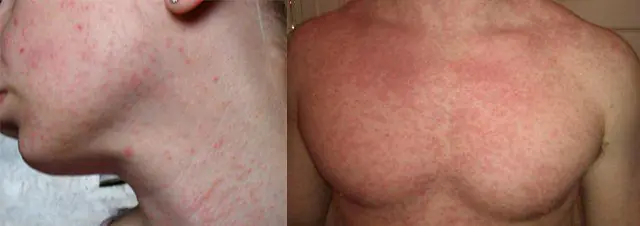
- If allergies occur from nerves, urticaria may also appear. The body becomes covered with blisters within a short time, the only difference from a true immediate type reaction is the lack of contact with the allergen.
- Nervous allergies can manifest as symptoms of rhinitis, irritation of the nasal mucosa, runny nose, sneezing, and lacrimation.
- A type of nerve allergy is bronchial asthma. Any stress can trigger an attack of suffocation.
- Dyspeptic disorders are most often observed in childhood, when diarrhea, bloating or severe pain occur in a state of emotional overstrain.
- Also, an allergy that arises due to nervousness can manifest itself as a paroxysmal cough. Antitussives do not provide relief.
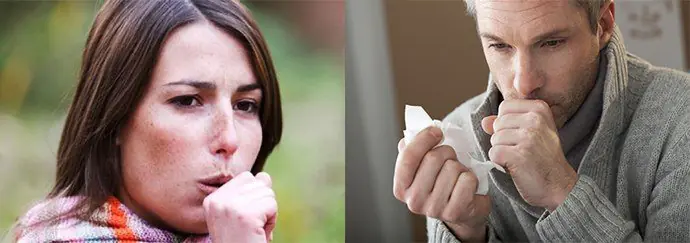
- An allergic rash on the mucous membranes of the mouth is possible, which can lead to an incorrect diagnosis - “stomatitis” and the prescription of the wrong treatment.
Regardless of the local manifestation, pseudoallergy is accompanied by a decrease in general well-being:
- rapid fatigue occurs, resulting in decreased ability to work;
- patients complain of sleep disturbances: they cannot sleep at night, drowsiness persists all day;
- the slightest irritating factor can cause a sudden attack of aggression;
- frequent migraines, neuralgia, muscle pain are observed;
- Periods of visual impairment occur, which also disappear suddenly.

An allergic reaction may occur as a result of contact with any product or substance to which a reaction does not occur in a calm state. This makes it difficult to make a diagnosis. The same substance can be used without consequences or cause a specific reaction.
Diagnostics
Usually, with such a reaction of the body, the patient turns to an allergist. If immunoglobulin tests are negative, this is not a reason to refuse treatment to a person.
If you suspect an allergy of an emotional nature, consult a psychologist or psychiatrist. People with increased excitability are most often susceptible to false allergies. Such personalities are easily identified by an experienced doctor by a sharp change in mood, emotional speech accompanied by pronounced facial expressions. Suspiciousness is not an unimportant factor in making a diagnosis.
A peculiarity of conducting skin tests with a substance to which an allergic reaction is suspected will be the dependence of the results on the emotional state of the patient. For example, a patient assumes the development of an allergy to coffee, a test in a calm environment will be negative, but with psycho-emotional stress it will be positive.

If the disease is of a nervous nature, the determination of immunoglobulin E is not effective and does not go beyond the norm. This will increase histamine levels.
Once the diagnosis is made, treatment is prescribed.
Allergy treatment
Allergies that arise from nervousness differ in treatment methods from the true ones due to the lack of contact with the allergen and the different nature of the development of the reaction.
For severe skin manifestations, antihistamines are used:
Considering that the provoking factor of the reaction will be nervous overstrain, complex treatment is required aimed at restoring psycho-emotional well-being.
- Working with a psychologist or psychotherapist.
- Acupuncture.
- Physiotherapeutic procedures that harmonize the state of the nervous system: circular shower, hydromassage bath, swimming in the pool, baths with sedative salt.

- Yoga or qigong will have a beneficial effect.
- Massage.
- General strengthening of the immune system.
All of the above treatment methods are highly effective in treating this disease. All remedies can be used regardless of age and general health. General restorative procedures aimed at restoring emotional peace are suitable for children, pregnant women, and adults.
Traditional medicine is used as an auxiliary therapy:
| Active substance | Traditional medicine recipe |
|---|---|
| Vinegar water | Mix 1 tablespoon of vinegar with plain water in equal quantities, dip a natural cloth into the prepared solution, squeeze and wipe the rash-affected areas of the skin. Carry out the procedure 2-3 times a day until complete recovery. |
| Tomato juice | It is diluted with distilled water in a ratio of 2:1 and used for wiping, just like vinegar water. |
| Bath using herbal decoction | Oak bark, string and chamomile are mixed in equal parts, pour 80 g of the resulting mixture into 1 liter of water and leave for 12 hours. Boil the resulting mixture, strain and dilute with 10 liters of water. Take a bath with the solution. With more bath water, more herbal infusion is prepared. It should be borne in mind that if there is an allergy due to nerves and the patient has expressed doubts about the treatment, if one nevertheless resorts to it, this may aggravate the condition. |
Prevention
Prevention of the disease has always been considered the best method of treatment. If you are prone to allergies due to nervousness, you should avoid stressful situations and emotional disturbances. Playing sports, walking in the fresh air, and doing what you love are considered effective helpers for harmonizing your state.



